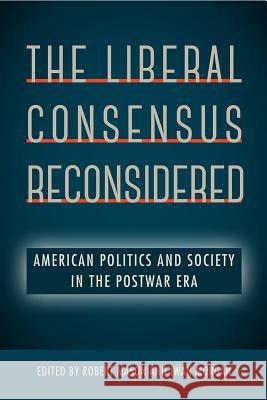The Liberal Consensus Reconsidered: American Politics and Society in the Postwar Era » książka
The Liberal Consensus Reconsidered: American Politics and Society in the Postwar Era
ISBN-13: 9780813054261 / Angielski / Twarda / 2017 / 304 str.
The Liberal Consensus Reconsidered: American Politics and Society in the Postwar Era
ISBN-13: 9780813054261 / Angielski / Twarda / 2017 / 304 str.
(netto: 334,48 VAT: 5%)
Najniższa cena z 30 dni: 349,77
ok. 22 dni roboczych.
Darmowa dostawa!
"An exceptionally fine collection that distills the very latest writing on midtwentieth-century U.S. politics and society."--Gareth Davies, author of From Opportunity to Entitlement: The Transformation and Decline of Great Society Liberalism "Offers a diverse mix of interpretations that demonstrate how this era was often marked by intense political and cultural conflict. Rightly cautions against drawing too sharp a contrast between this period and the polarization of our time."--Timothy N. Thurber, author of Republicans and Race: The GOP's Frayed Relationship with African Americans, 1945-1974 When first published in 1976, Godfrey Hodgson's America in Our Time won immediate recognition as a major interpretive study of the postwar era. Although the term liberal consensus, or its approximation, had received some previous expression, Hodgson was responsible for its entry into the lexicon of American history. Yet what he considered a substantive phenomenon would inevitably become a controversial paradigm as a massive outpouring of literature cited evidence of a significant conservative presence at the grassroots level from the 1930s to the 1960s. Here, leading scholars--including Hodgson himself--confront the longstanding theory that a liberal consensus shaped the United States after World War II. The essays draw on fresh research to examine how the consensus related to key policy areas, how it was viewed by different factions and groups, what its limitations were, and why it fell apart in the late 1960s. They find that although elite politicians from both parties did share certain principles that gave direction to postwar America, the nation still experienced major political, cultural, and ideological conflict. Identifying the forces at work that gave rise to a newly confident conservatism promoted by corporate leaders, Sunbelt boosters, and religious activists, the contributors offer new insights into the era and diverging opinions on one of the most influential interpretations of mid-twentieth-century U.S. history. Robert Mason, professor of history at the University of Edinburgh, is the author of The Republican Party and American Politics from Hoover to Reagan. Iwan Morgan, professor of United States studies at University College London, is the author of Reagan: American Icon and coeditor of From Sit-Ins to SNCC: The Student Civil Rights Movement in the 1960s.











